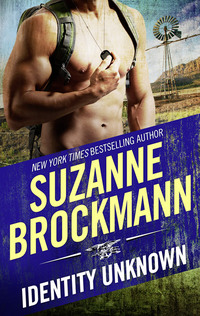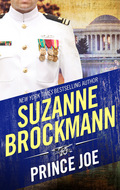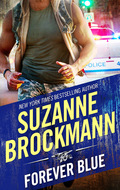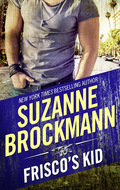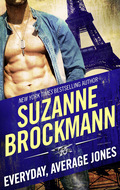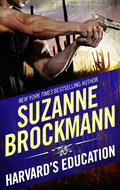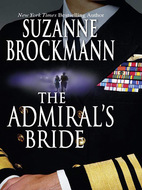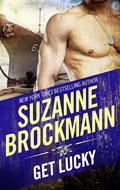Kitap dosya olarak indirilemez ancak uygulamamız üzerinden veya online olarak web sitemizden okunabilir.
Kitabı oku: «Identity: Unknown»
New York Times and USA TODAY bestselling author Suzanne Brockmann has thrilled audiences with her Tall, Dark and Dangerous series. Experience it here with a hero who must face the most daring adventure of all—falling in love.
Can she create a future with a man without a past?
Navy SEAL Mitchell Shaw wakes up one morning without a clue who he is. And the items in his possession are no help: an address he doesn’t recognize and a .22-caliber sidearm. But the address eventually leads him to the Lazy 8 Ranch—and its beautiful manager, Becca Keyes, who makes him believe he might have a future, even if he doesn’t remember his past.
He froze, staring at the face in the mirror.
He turned his head to the right and then to the left. The face in the mirror moved when he moved. It definitely belonged to him.
But it was the face of a stranger.
A wave of dizziness hit him hard and he grabbed at the sink, lowering his head and closing his eyes until the worst of it passed.
How did he get here? Almighty God, he couldn’t even remember his name.
Suddenly feeling something in his shoe, he went into a corner of the room and started to pull off one of his boots. And then he quickly pulled it back on again.
He was carrying a side arm. A .22-caliber.
In his boot.
Dear Reader,
Once again, Silhouette Intimate Moments brings you an irresistible lineup of books, perfect for curling up with on a winter’s day. Start with Sharon Sala’s A Place To Call Home, featuring a tough city cop who gets away to the Wyoming high country looking for some peace and quiet. Instead he finds a woman in mortal danger and realizes he has to help her—because, without her, his heart will never be whole.
For all you TALL, DARK AND DANGEROUS fans, Suzanne Brockmann is back with Identity: Unknown. Navy SEAL Mitchell Shaw has no memory of who—or what—he is when he shows up at the Lazy 8 Ranch. And ranch manager Becca Keyes can’t help him answer those questions, though she certainly raises another: How can he have a future without her in it? Judith Duncan is back with Marriage of Agreement, a green-card marriage story filled with wonderful characters and all the genuine emotion any romance reader could want. In His Last Best Hope, veteran author Susan Sizemore tells a suspenseful tale in which nothing is quite what it seems but everything turns out just the way you want. With her very first book, New Zealander Fiona Brand caught readers’ attention. Heart of Midnight brings back Gray Lombard and reunites him with the only woman strong enough to be his partner for life. Finally, welcome Yours Truly author Karen Templeton to the line. Anything for His Children is an opposites-attract story featuring three irresistible kids who manage to teach both the hero and the heroine something about the nature of love.
Enjoy every one of these terrific novels, and then come back next month for six more of the best and most exciting romances around.
Yours,

Leslie J. Wainger
Executive Senior Editor
Identity: Unknown
Suzanne Brockmann

MILLS & BOON
Before you start reading, why not sign up?
Thank you for downloading this Mills & Boon book. If you want to hear about exclusive discounts, special offers and competitions, sign up to our email newsletter today!
Or simply visit
Mills & Boon emails are completely free to receive and you can unsubscribe at any time via the link in any email we send you.
For Lee Brockmann
CONTENTS
Cover
Back Cover Text
Dear Reader
Title Page
CHAPTER 1
CHAPTER 2
CHAPTER 3
CHAPTER 4
CHAPTER 5
CHAPTER 6
CHAPTER 7
CHAPTER 8
CHAPTER 9
CHAPTER 10
CHAPTER 11
CHAPTER 12
CHAPTER 13
CHAPTER 14
CHAPTER 15
CHAPTER 16
Copyright
CHAPTER 1
“Hey, hey, hey there, Mission Man! How ya doin’, baby? Rise and shine! That’s my man—open those eyes. It’s def initely the a.m. and in the a.m. here at the First Church Shelter, we go from horizontal to vertical.”
Pain. His entire world had turned into a trinity of pain, bright lights and an incredibly persistent voice. He tried to turn away, tried to burrow down into the hard mattress of the cot, but hands shook him—gently at first, then harder.
“Yo, Mish. I know it’s early, man, but we’ve got to get these beds cleaned up and put away. We’re serving up a nice warm breakfast along with an A.A. meeting in just a few minutes. Why don’t you give it a try? Sit and listen, even if your stomach can’t handle the chow.”
A.A. Alcoholics Anonymous. Could it possibly be a hangover that was making him feel as if he’d been hit by a tank? He tried to identify the sour taste in his mouth but couldn’t. It was only bitter. He opened his eyes again, and again his head felt split in two. But this time he clenched his teeth, forcing his eyes to focus on a smiling, cheerful, weather-beaten African-American face.
“I knew you could do it, Mish.” The voice belonged to the face. “How you doin’, man? Remember me? Remember your good friend Jarell? That’s right, I tucked you into this bed last night. Come on, let’s get you up and headed toward the men’s room. You could use a serious washing up, my man.”
“Where am I?” His own voice was low, rough and oddly unfamiliar to his ears.
“The First Church Homeless Shelter, on First Avenue.”
The pain was relentless, but now it was mixed with confusion as he slowly, achingly sat up. “First Avenue…?”
“Hmm,” the man named Jarell made a face. “Looks like you had yourself a bigger binge than I thought. You’re in Wyatt City, friend. In New Mexico. Ring any bells?”
He started to shake his head, but the hellish pain intensified. He held himself very still instead, supporting his forehead with his hands. “No.” He spoke very softly, hoping Jarell would do the same. “How did I get here?”
“A couple of Good Sams brought you in last night.” Jarell hadn’t gotten the hint, and continued as loud as ever. “Said they found you taking a little nap with your nose in a puddle, a few blocks over in the alley. I checked your pockets for your wallet, but it was gone. Seems you’d already been rolled. I’m surprised they didn’t take those pretty cowboy boots of yours. From the looks of things, though, they did take the time to kick you while you were down.”
He brought his hand to the side of his head. His hair was filthy, and it felt crusty, as if it were caked with blood and muck.
“Come on and wash up, Mission Man. We’ll get you back on track. Today’s a brand-new day, and here at the shelter, the past does not equal the future. From here on in, you can start your life anew. Whatever’s come before can just be swept away.” Jarell laughed, a rich, joyful sound. “Hey, you’ve been here more than six hours, Mish. You can get your six-hour chip. You know that saying, One Day at a Time? Well, here on First Avenue, we say one hour at a time.”
He let Jarell help him to his feet. The world spun, and he closed his eyes for a moment.
“You got those feet working yet, Mish? That’s my man. One foot in front of the other. Bathroom’s dead ahead. Can you make it on your own?”
“Yes.” He wasn’t sure that he could, but he would have said nearly anything to get away from Jarell’s too-loud, too-cheerful, too-friendly voice. Right now the only friend he wanted near him was the blessed, healing silence of unconsciousness.
“You come on out after you get cleaned up,” the old man called after him. “I’ll help you get some food for both your belly and your soul.”
He left Jarell’s echoing laughter behind and pushed the men’s-room door open with a shaking hand. All of the sinks were occupied, so he leaned against the cool tile of the wall, waiting for a turn to wash.
The large room was filled with men, but none of them spoke. They moved quietly, gingerly, apologetically, careful not to meet anyone’s eyes. They were careful not to trespass into one another’s personal space even with a glance.
He caught a glimpse of himself in the mirror. He was just another one of them—disheveled and unkempt, hair uncombed, clothes ragged and dirty. He had the bonus of a darkening patch of blood on his dirt-stained T-shirt, the bright red turning as dingy as the rest of him as it dried.
A sink opened up, and he moved toward it, picking up a bar of plain white soap to scrub the grime from his hands and upper arms before he tackled his face. What he truly needed was a shower. Or a hosing down. His head still throbbed, and he moved it carefully, leaning toward the mirror, trying to catch a look at the gash above his right ear.
The wound was mostly covered by his dark shaggy hair and…
He froze, staring at the face in front of him. He turned his head to the right and then to the left. The face in the mirror moved when he moved. It definitely belonged to him.
But it was the face of a stranger.
It was a lean face, with high cheekbones. It had a strong chin that badly needed a shave, except for a barren spot marked by a jagged white scar. A thin-lipped mouth cut a grim line, and two feverish-looking eyes that weren’t quite brown and weren’t quite green stared back at him. Tiny squint lines surrounded the edges of those eyes, as if this face had spent a good share of its time in the hot sun.
He filled his hands with water, splashing it up and onto his face. When he looked into the mirror again, the same stranger looked back at him. He hadn’t managed to wash that face away and reveal…what? A more familiar visage?
He closed his eyes, trying to recall features that would’ve been more recognizable.
He came up blank.
A wave of dizziness hit him hard and he grabbed at the sink, lowering his head and closing his eyes until the worst of it passed.
How did he get here? Wyatt City, New Mexico. It was a small city, a town really, in the southern part of the state. It wasn’t his home…was it? He must’ve been here working on…working on…
He couldn’t remember.
Maybe he was still drunk. He’d heard about people who’d had so much to drink they went into a blackout. Maybe that was what this was. Maybe all he’d have to do was sleep this off and everything he was having trouble remembering would come back to him.
Except he couldn’t remember drinking.
His head hurt like the devil. Heaven knew all he wanted to do was curl up in a ball and sleep until the pounding in his brain stopped.
He leaned down into the sink and tried to rinse the cut on the side of his head. The lukewarm water stung, but he closed his eyes and persisted until he was sure it was clean. Long hair dripping, he blotted himself dry with some paper towels, gritting his teeth as the rough paper scraped against his abraded skin.
It was too late to get stitches. The wound had already started to scab. He was going to have a scar from this one, but maybe some butterfly bandages would help. He’d need his first-aid kit and…And…He stared at himself in the mirror. First-aid kit. He wasn’t a doctor. How could he be a doctor? And yet…
The men’s-room door opened with a bang, and he spun around, reaching beneath his jacket for…Reaching for…
Dizzy, he staggered back against the sink. He wasn’t wearing a jacket, just this sorry T-shirt. And sweet Lord help him, but he had to remember not to move fast or he’d end up falling on his face.
“The Ladies’ Auxiliary is having a clothing drive,” one of the shelter workers announced in a too-loud voice that made many of the men in the room cringe. “We’ve got a box of clean T-shirts, and another one full of blue jeans. Please take only what you need and save some for the next guy.”
He looked up into the mirror at the stained and grimy T-shirt he wore. It had been white at one time—probably just last night, although he still couldn’t remember back that far. He pulled it up and over his head, gingerly avoiding the wound above his right ear.
“Dirty laundry goes into this basket over here,” the shelter worker trumpeted. “If it’s labeled, you’ll get it back. If it’s torn, throw it out and take two.” The worker looked up at him. “What size do you need?”
“Medium.” It was something of a relief to finally know the answer to a question.
“You in need of jeans?”
He looked down. The black pants he was wearing were badly torn. “I could use some, yeah. Thirty-two waist, thirty-four inseam, if you’ve got ’em.” He knew that, too.
“You’re the one Jarell called the Mission Man,” the shelter worker remarked as he searched through the box.
“He’s a good guy—Jarell. A little too religious for my taste, but that wouldn’t bother you, would it? He’s always giving everyone nicknames. Mission Man. Mish. What kind of name is Mish anyway?”
His name. It was… his name? It was, but it wasn’t. He shook his head, trying to clear it, trying to remember his name.
Dammit, he couldn’t even remember his name.
“Here’s a pair what’s got a thirty-three-inch waist,” the shelter worker told him. “That’s the best I can do for you, Mish.”
Mish. He took the jeans, briefly closing his eyes so that the room would stop spinning around him, calming himself. So what if he couldn’t remember his name? It would come back to him. With a good night’s sleep, it would all come back to him.
He told himself that again and again, using it like a mantra. He was going to be fine. Everything was going to be fine. All he needed was a chance to close his eyes.
He went into the corner of the room, out of the line of traffic around the sinks and stalls, and started to pull off one of his boots.
He quickly pulled it back on again.
He was carrying a side arm. A .22-caliber.
In his boot.
It was slightly larger than palm-sized, black and deadly looking. There was something else in his boot, too. He could feel it now, pressing against his ankle.
He took his jeans into one of the stalls, locking the door behind him. Slipping off the boot, he looked inside. The .22 was still there, along with an enormous fold of cash—all big bills. There was nothing smaller than a hundred in the thick rubber-banded wad.
He flipped through it quickly. He was carrying more than five thousand dollars in his boot.
There was something else there, too. A piece of paper. There was writing on it, but his vision swam, blurring the letters.
He took off the other boot, but there was nothing in that one. He searched the pockets of his pants, but came up empty there, too.
He stripped off his pants and pulled on the clean jeans, careful to brace himself against the metal wall the entire time. His world was tilting, and he was in constant danger of losing his balance.
He slipped his boots back on, somehow knowing how to position the weapon so that it wouldn’t bother him. How could he know that, know what size jeans he wore, yet not know his own name? He put most of the money and the piece of paper back in his boot as well, leaving several hundred dollars in the front pocket of his jeans.
He came face-to-face with his reflection in the mirror when he opened the door of the stall.
Even dressed in clean clothes, even washed up, long, dark hair slicked back with water, even pale and gray from the pain that still pounded through his battered body, he looked like a man most folks would take a wide detour around. His chin had a heavy growth of stubble, accentuating his already sun-darkened complexion. His black T-shirt had been washed more than once and had shrunk slightly. It hugged his upper body, outlining the muscles of his chest and arms. He looked like a fighter, hard and lean.
Whatever he really did for a living, he still couldn’t remember. But considering that .22 he had hidden in his boot, he could probably cross kindergarten teacher off the list of possibilities.
Rolling up his torn pants, he tucked them under his arms. He pushed open the men’s-room door and skirted the room where breakfast and temperance were being served. Instead, he headed directly for the door that led to the street.
On his way out, as he passed the shelter’s donation box, he dropped a hundred-dollar bill inside.
* * *
“Mr. Whitlow! Wait!”
Rebecca Keyes headed for Silver at a dead run, swinging herself up into the saddle and digging her boots into the big gelding’s sides. Silver surged forward, in hot pursuit of the gleaming white limousine that was pulling down the dude ranch’s dirt driveway.
“Mr. Whitlow!” She put two fingers in her mouth and whistled piercingly, and finally the vehicle slowed.
Silver blew out a loud burst of air as she reined him in next to the almost absurdly stretched-out body of the car. With a faint mechanical whine, the window came down and Justin Whitlow’s ruddy face appeared. He didn’t look happy.
“I’m sorry, sir,” Becca said breathlessly from her perch atop Silver. “Hazel told me you were leaving, that you were going to be gone a month and I…I wish you had informed me earlier, sir. We have several things to discuss that can’t wait an entire month.”
“If this is more of your wages garbage—”
“No, sir—”
“Thank God.”
“—because it’s not garbage. It’s a very real problem we’re having here at the Lazy Eight. We’re not paying the ranch hands enough money, so they’re not sticking around. Did you know we’ve just lost Rafe McKinnon, Mr. Whitlow?’
Whitlow stuck a cigarette between his lips, squinting up at her as he lit it. “Hire someone new.”
“That’s what I’ve been doing with staff turnovers,” she said with barely concealed frustration. “Hiring someone new. And someone else new. And…” She drew in a deep breath and tried her best to sound reasonable. “If we’d simply paid someone solid and responsible like Rafe another two or three dollars an hour—”
“Then he would’ve asked for another raise next year.”
“Which he would have deserved. Frankly, Mr. Whitlow, I don’t know where I’m going to find another stable hand like Rafe. He was a good man. He was reliable and intelligent and—”
“He was obviously overqualified. I wish him luck at his next endeavor. We don’t need to hire rocket scientists, for God’s sake. And how reliable do you need a man to be, to shovel—”
“Mucking out the stalls is only a small part of the job description,” Becca countered hotly. She took a deep breath, forcing herself to calm down again. She’d never won a shouting match with her boss, and she wasn’t likely to start winning that way now. “Mr. Whitlow, I don’t know how you expect the Lazy Eight to gain the reputation of being a high-class dude ranch if you insist on paying your staff slave wages.”
“Slave wages for slave labor,” Whitlow commented.
“My point exactly,” Becca said, but he just blew cigarette smoke out the window.
“Don’t forget about that opera thing in Santa Fe next week,” he commanded as, with a soft buzz, his window began to shut. “I’m counting on you to be there. And for heaven’s sake, dress like a woman. None of those pantsuits that you wore last time.”
“Mr. Whitlow—”
But the window closed tightly. She had been dismissed. Silver sidled to the right as the limo pulled away and Becca swore pungently.
Slave wages for slave labor, indeed. Except Whitlow had it wrong. He believed he was paying his staff low wages for low-priority, bottom-of-the-barrel, physical-labor jobs. But the truth was, without those jobs done and done well, the entire ranch suffered. And if the owner insisted on paying low, the quality of work he’d get in return would also be low. Or the workers would leave—like Rafe McKinnon had, and Tom Morgan last week, and Bob Sharp earlier in the month.
It seemed all Becca did these days was office work. Far too often, she found herself sitting inside, behind her desk, doing phone interviews to fill all-too-frequently-vacated staff positions.
She’d taken this job at the Lazy Eight Ranch because it was an opportunity to use her management skills and put in most of her hours out-of-doors.
She loved riding, loved the hot New Mexico sun, loved the way the storm clouds raced across the plains, loved the reds and browns and muted greens of the mountains. She loved the Lazy Eight Ranch.
But working for Justin Whitlow was the pits. And who said a woman couldn’t look feminine in a pair of pants, anyway? What did he expect her to wear to schmooze with his friends and business associates? Something extremely low-cut, with sequins? As if she could even afford such a thing on her pitiful salary.
Yes, she loved it here, but if things didn’t change, it was only a matter of time before she walked, too.
* * *
The night was moonless, but he lay quietly on his stomach, taking the time for his eyes to get fully used to the dark again, and in particular the dark here, just inside of the high-security fence.
He breathed with the sounds of the night—crickets and bullfrogs and the trees whispering overhead in the gentle wind.
He could see the house on the hill, and he silently crept closer on his knees and elbows, staying low, staying invisible.
He stopped, smelling the cigarette before he saw the red glow of light. The man was alone. Far enough away from the house.
He silently lifted his rifle, double-checking it before he sighted along the sniper’s scope. He brought the night-vision setting up a notch so he could really look at the target. And the man with the cigarette was the target. Not the gardener out for a late-night stroll. Not the chef hunting for the perfect variety of wild mushrooms. No, he recognized this man’s face from the photos he’d seen. He gently squeezed the trigger and…
Boom.
The muffled sound of the gunshot still managed to pierce his eardrums, set his teeth on edge, stab through his brain.
Eyes wide open, he sat up, instantly aware that he’d been dreaming. The only noise in the dimly lit room was his ragged breathing.
But the room was unfamiliar, and he felt a new wave of panic. Where in hell was he now?
Wherever it was, it was a far cry from the church shelter he’d woken up in yesterday morning.
His gaze swept across the impersonal furnishings, the cheesy oil paintings on the wall, and it came to him. Motel room. Yes, he’d checked in to this place yesterday morning, after leaving the shelter. His head had been pounding, and he’d wanted only to fall into bed and sleep.
He’d paid in cash and signed the registration M. Man.
Heavy curtains were pulled across the windows, letting in only a tiny sliver of bright morning light. Hands still shaking from his dream, he pushed the covers off, aware that the sheets were soaked with his own sweat. His head still felt tender, but no longer as if the slightest movement would make him want to scream.
He could remember, almost word for word, the brief conversation he’d had with the man at the motel’s front desk. He remembered the aromatic smell of coffee in the motel lobby. He remembered the clerk’s name—Ron—worn on a badge on his chest. He remembered how endlessly long it had taken Ron to find the key to room 246. He remembered pulling himself up the stairs, one step at a time, driven by the knowledge that soothing darkness and a soft bed were within reach.
He could remember that dream he’d just had, too, and he didn’t want to think about what it might mean.
He stood up, aware that the movement jarred him only slightly, and crossed to the air conditioner, turning it to a higher setting. The fan motor kicked in with a louder hum, and coolness hit him in a wave of canned air.
Slowly, deliberately, he sat back down on the edge of the bed.
He could remember the shelter. He could see Jarell’s smiling face, hear the sound of his cheerful voice. Hey, Mission Man. Hey, Mish!
He closed his eyes and relaxed his shoulders, waiting for memories of being brought into the shelter, waiting for memories of what had happened that night.
But there was nothing there.
There was only…emptiness. Nothingness. As if before he’d been brought to the First Avenue Shelter, he hadn’t existed.
He could feel a new sheen of perspiration covering his body despite the cooler setting of the air conditioner. He’d slept off whatever had ailed him—whether it was the result of alcohol or some other controlled substance or simply the blow he’d received to his head. In fact, he’d slept solidly for more than twenty-four hours.
So why the hell couldn’t he remember his own damned name?
Hey, Mission Man. Hey, Mish!
He stood up, staggering slightly in his haste to get to the mirror that covered the wall in front of a double set of sinks. He flipped on the light and…
He remembered the face that looked back at him. He remembered it—but only from the bathroom mirror at the shelter. Before that, there was…
Nothing.
“Mish.” He spoke aloud the nickname Jarell had given him. The word sent a small ripple of recognition through him again, as it had yesterday morning. But what kind of name was Mish? Was it possible that he remembered—very faintly—Jarell calling him that when he was first brought into the shelter?
Mish. He gazed into the unfamiliar swirl of green and brown that were his own eyes. What kind of name was Mish? Well, right now, it was the only name he’d got.
Mish splashed cold water on his face, then cupped his hand under the faucet and drank deeply.
What was he supposed to do now? Go to the police?
No, that was out of the question. He couldn’t do that. He wouldn’t be able to explain the .22 and that huge wad of money he was carrying in his boot. He knew—he didn’t know how he knew, but he did—that he couldn’t tell the police, couldn’t tell any one anything. He couldn’t let anyone know why he was here.
Not that he could have, even if he’d wanted to. He didn’t know why he was here.
So what was he supposed to do?
Check himself into a hospital? He turned his head, gingerly parting his hair to look at the gash on his head. Without yesterday’s fog of pain clouding his eyes, he knew with a chilling certainty that the wound on his head had been the result of a bullet’s glancing blow. He’d been shot, nearly killed.
No, he couldn’t go to a hospital, either—they’d be forced to report his injury to the police.
He dried his face and hands on a small white towel and went back into the main part of the motel room. His boots were on the floor near the bed, where he’d left them last night. He picked up the right one, dumping its contents onto the rumpled sheets. He turned on the light and sat down, picking up the .22.
It fit perfectly, familiarly into his hand. He couldn’t remember his own name, but somehow he knew he’d be able to use this weapon with deadly accuracy if the need ever arose. This weapon, and any other, as well. He remembered his dream, and he set it back down on the bed.
He pulled the rubber band off the fold of money, and the piece of white paper that was fastened along with it slipped free. It was fax paper; the slippery, shiny kind that was hard to read. He picked it up and angled it toward the light.
“Lazy Eight Ranch,” he read. Again, the name was totally unfamiliar to him. There was an address and directions to some kind of spread up in the northern part of the state. From what he could tell from the directions, it was about four hours outside of Santa Fe. The words were all typed, except for a note scrawled across the bottom in big round handwriting. “Looking forward to meeting you.” It was signed, “Rebecca Keyes.”
Mish opened the bedside-table drawer, looking for a telephone book. But the only thing inside was a Gideons Bible. He picked up the phone and dialed the front desk.
“Yeah, is there a train station or a bus depot in town?” he asked when the desk clerk came on the line.
“Greyhound’s just down the street.”
“Can you give me the phone number?”
He silently repeated the number the clerk gave him, hung up, then dialed the phone.
He was going to Santa Fe.
Ücretsiz ön izlemeyi tamamladınız.
